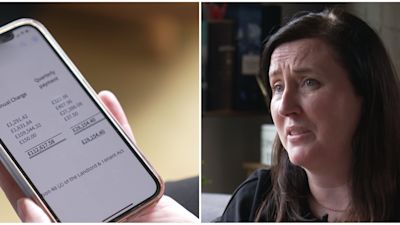'It’s soul-destroying': People trapped in unsafe homes as cladding crisis sees flat sales plummet

Thousands of people like Rachael Loftus, who bought flats across Greater Manchester and beyond, have been hit by huge bills to fix a problem not of their making, reports ITV News Social Affairs Correspondent Sarah Corker
Manchester’s skyline has changed dramatically in recent years. Shiny new high-rise apartments spring up on an almost weekly basis, attracting a new generation of people to the city.
But the building boom hasn’t been good news for everyone - the city also has the unenviable title of the ‘cladding capital’ of the north.
Safety inspections in the wake of the Grenfell tragedy have exposed fire safety faults in more than 200 buildings across Greater Manchester.
Tom Brothwell’s block in the old industrial heart of the city is one of them. He bought his flat in 2017 but later found out it had safety problems which would cost millions to fix. His building is registered to the government’s £5.1 billion Building Safety Fund in July 2020 for help. They are still waiting to find out what remediation work will be covered by the funding.
“You can’t sell, you can’t re-mortgage, essentially we are trapped until we know when the building will be fixed and who will pay for it,” he said.
Cladding campaigners say accessing funding is a complex process and has been plagued with delays.
Across England, almost 3,500 high rise blocks have applied to the Building Safety Fund for money to remove dangerous cladding. ITV News has learnt that work has started on only 7% of those blocks and has been completed on just 26 buildings.
Buildings under 18 metres or with non-cladding faults are not eligible for BSF funding - more than 912 applications have been rejected, and another 366 are being reviewed or awaiting further information.
"Everything is on hold, we're trapped here" - Tom Brothwell says it is "shameful" how residents stuck in unsellable and potentially dangerous flats have been failed
Mr Brothwell, 40, holds the government and construction industry equally responsible for the "shameful" safety failings that have paralysed parts of the property market.
“The response from industry has been weak, and even with the government trying to force them to do something, they are still resisting. They made their money out of these blocks and they are leaving people in unsafe homes, it’s soul-destroying. We don’t know when this will end,” he said.
The government is leaning on developers hard and it’s working. Some of the biggest housebuilders have agreed to pay to fix their blocks but Mr Brothwell’s developer is one of those holding out.
Nearly five years since the Grenfell Tower fire where 72 people died, an estimated half a million people are still living in unsafe flats wrapped in dangerous materials. The impact on the housing market has been huge as thousands of sales have already fallen through.
Manchester-based estate agent Julie Twist said that up to 60% of their stock of flats is unsellable.
“We are really short of stock. There are just so many properties that we can’t sell. They are either applying for funding, they are having the work done, or some haven’t even started the process yet.”
Flat sales as a proportion of all home sales since 2012
Graph analysis of ONS Data by Capital Economics.
In Leeds, Rachael Loftus, 45, has been stuck in limbo for two years since cladding defects and other faults were discovered on her building.
She bought her one-bed flat for £89,000 in 2008 and has been issued with a bill for £112,000 from her managing agent for her share of the remediation work.
“It’s just all so desperately unfair and is having a massive impact on mental health," she said.
"I'm just really increasingly seeing how powerless you are as an individual leaseholder to push back against any of that."
The good news is that her building has qualified for government funding to remove the cladding, but it’s not known how much of the work it will pay for. Ms Loftus hopes she won’t have to pay, but for now, this huge debt is against her name and there’s still no sign of any work starting.
"It's heartbreaking ... You are so powerless" - Rachael Loftus, 45, has been stuck in limbo for two years since cladding defects and other faults were discovered on her building
“If you told me 29 months ago that we'd still be in this position, I wouldn’t have believed it was possible that in the UK in this day and age, those in authority would be so comfortable with people living in homes that may or may not be safe,” Ms Loftus said.
New laws coming into force should help to protect people from large bills. In the worst-case scenarios, when developers or building owners cannot or will not foot the bill, the government says leaseholders will pay no more than £10,000, or £15,000 in London.
Building Safety Fund applications Total applications (private and social) – 3451 Proceeding - 1106Work started – 243Work completed – 26
Source: https://www.gov.uk/guidance/remediation-of-non-acm-buildings
A Department for Levelling Up, Housing and Communities spokesperson said: “We continue to see progress in making higher-rise buildings safer, but we are clear more must be done.
“We are actively pursuing building owners who have failed to act to replace unsafe cladding on higher-rise buildings and are accelerating the work of the Building Safety Fund.
“Forty-five of the largest developers have agreed to play their part in fixing buildings over 11m. The levelling up secretary has warned he will not hesitate to use new powers against those that fail to act."